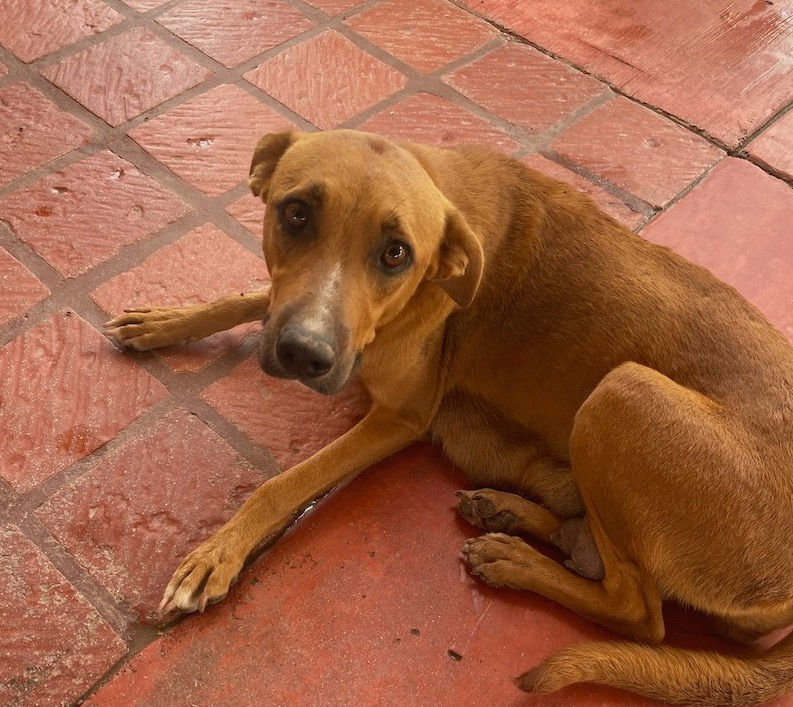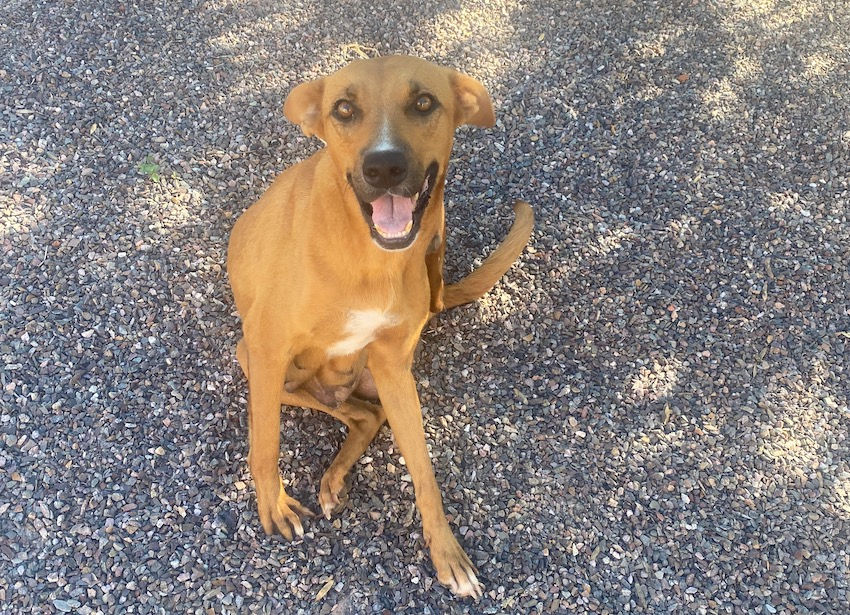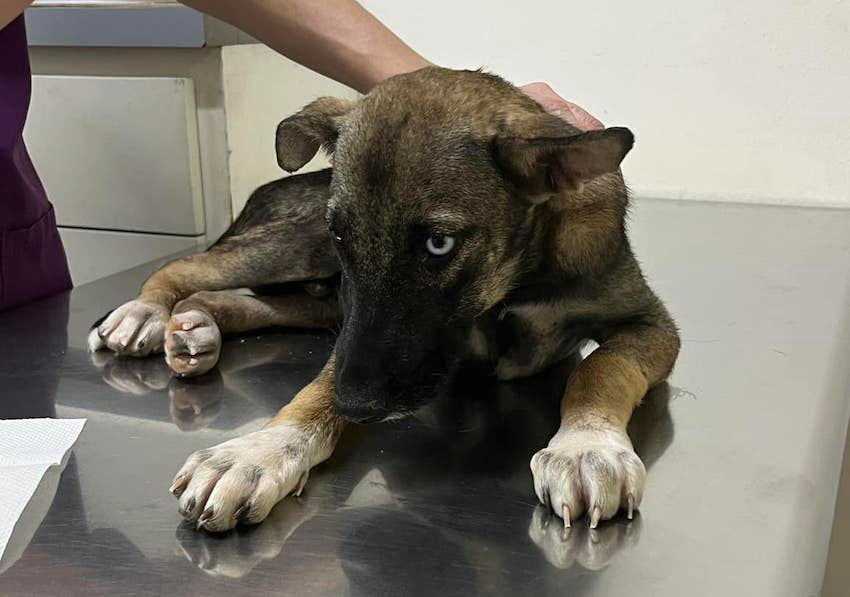Lizzie's Story
- rebeccamacd
- Sep 29, 2023
- 6 min read
Updated: Sep 30, 2023
Read about the impact sterilization can have on animal welfare in La Paz, BCS, Mexico
By Rebecca MacDonald, President
Baja Dogs Sterilizations
This is a story about one stray dog, named Lizzie, who was rescued in La Paz, Baja California Sur, Mexico. It is part of a series of stories we are writing to help illustrate why pet sterilization is so important to the health and wellness of our pets, our families, and our community.
When I first met Lizzie, she was just another stray dog, one of the estimated 50,000 strays roaming the streets here in La Paz, Baja California, Mexico. I had heard about Lizzie from a friend, who had seen her hanging around a roadside lunch spot in our local community of El Centenario, about 20 minutes outside of downtown La Paz.

My husband, Jim, and I get calls about stray dogs all the time. Unfortunately, there are no city-run animal shelters here in La Paz. So, we are used to seeing dogs in desperate circumstances on the streets here – if you can ever really get used to it. We do not run a formal rescue organization. We simply try to help as many as we can, whenever we can. But, we’ve had to deal with the sad fact that we can’t save them all.
For those who come to La Paz and are horrified by the “street dog problem,” I offer you these facts:
· In the U.S. alone, approximately 6.3 million pets enter animal shelters every year.
· Of those, nearly one million animals are euthanized. Every. Year. (Source)
Just because you don’t have to see the effects of pet abandonment every day in your neighborhood, doesn’t mean it isn’t happening. The end result is the same.
When I got the message about Lizzie, our house was full. Overfull. We were not prepared to take a new dog in at that time. However, I thought this "stray" might be the same dog a neighbor in our community had been reporting as lost on Facebook, so I went to have a look.
Turns out, Lizzie wasn’t that owner’s dog. She was just another stray. Starving. Thin. Scared. Her fur falling out from malnutrition. And big, liquid brown eyes that implored, “Please help me.”

But Lizzie wasn’t asking for help only for herself.
The staff at the café told me that Lizzie had just given birth to a litter of 8 puppies. The workers had been feeding Lizzie, and said her puppies were hidden somewhere in an overgrowth of bushes on the other side of the highway. We went and searched the bushes, but the undergrowth was too dense, and the area too large. We couldn’t find the pups.
Those who live in El Centenario know that the highway there gets very busy, with cars and big trucks speeding through at all hours. Leaving Lizzie at that café on the side of the highway was a gamble. We’ve pulled more than one injured (and worse) dog off that highway. The café closes around 2pm, and after that, Lizzie would be heading back across the highway, taking her chances among the speeding cars to go feed her pups. I reluctantly left Lizzie lying in her spot under the palapa at the back of the restaurant, knowing that her pups needed her to survive.

The next day, I went back to check on Lizzie. To my surprise, the workers at the restaurant told me that Lizzie had relocated her puppies. The night before, she had carried each of her pups, one by one, across the highway, and hidden them in the grass behind the cafe so she could remain closer to her food source and to her pups. It was a brave move, but Lizzie is one smart and very brave girl.
However, the pups were now buried in thick, waist-high grass behind the café, and scattered over several yards. Only a few days old, still tiny and blind, they would have no way of finding their mama to nurse. We had to step cautiously as we searched the field to avoid stepping on the pups before we could locate them. One by one, we searched for and eventually found seven puppies.
As I turned back toward the car with a tiny pup in each hand, I heard a squeal. Immediately, I paused. Sure enough, there was number eight, buried in a clump of grass right under my feet.
After confirming with the staff that there were no more than eight pups, we loaded them all into a crate in the back of my car. Mama Lizzie was scared, but our brave girl stayed close enough to watch what was happening to her pups. With a little encouragement, the workers were able coax her closer and lift her, too, into the back of our truck.

We named her Lizzie, in honor of the late Queen Elizabeth II, who had passed away on September 8th, 2022, the same day Lizzie was rescued. Lizzie joined 18 other dogs, including 2 other litters of puppies and 3 adult dogs, that were being fostered for adoption at the time in our home.
It's not easy raising a litter of puppies. They need to be quarantined in their own area and separated from other rescues and household pets, in case they are sick. Unfortunately, we can’t give mama or the puppies any medicine while they are nursing. So even if mama needs treatment, as Lizzie did, we wait. We feed her often and well, and hope that it’s enough, for now.

Once they can be separated from the mama, we get the puppies dewormed, and start a series of 4 vaccines, given every 2 weeks. When they are old enough, we sterilize them. Only then can we start the process of trying to find them homes.
About a month after her rescue, we were able to separate Lizzie from her pups and begin her treatment. She was suffering anemia from a tick-borne disease called erlichiosis. Her fur was still falling out, as most of her nutrition had been going into feeding her pups. She had a nervous tic that the vet called “fly catching,” where she snapped at imaginary flies in the air. He said it was due to all the stress.
But with food and love, Lizzie quickly began to recover. It’s a transformation we’ve seen over and over again, and one that never gets old. She loved being petted and, when she got excited, doing zoomies around the yard. She had a big smile and bright, intelligent eyes. She loved going on walks. Her fur began to grow in and shine. She loved spending time with us, her foster humans.

Later, we were lucky enough to find Lizzie two different wonderful foster homes. Kind, lovely people who helped bring her back from starvation and finish her treatment for erlichia. People who loved her and treated her like she was their own. Lizzie blossomed under their care, and transformed into a truly loving, playful and loyal girl. Of course, when she was well enough, we got Lizzie sterilized. No more puppy litters for this mama dog.

Fortunately, we rescued Lizzie and her puppies in time. Her puppies all survived, and went on to be adopted. They are now safe, healthy and happy, in loving homes.
Not all pups are as lucky as Lizzie’s. Every year, dozens of litters of unwanted puppies are born to a life on the street in La Paz, where they suffer and, too often, die from neglect or disease. They get separated from their mamas. The mamas go in search of food, and get hit by a car, and never make it back. Or the puppies get dumped somewhere on their own.
Many of the puppies we take in are often sick with deadly diseases like parvovivus, giardia, distemper, or erlichiosis. Before we can get them vaccinated, we must first get them healthy.
We fight for their lives. We don’t always win.

Sterilization is the only way to reduce the number of dogs like Lizzie and her pups that need to be rescued. The ONLY way. Talking about sterilization campaigns does not make for as romantic or heartwarming a story as an adoption story. But it makes a huge difference. HUGE. To us. To dogs like Lizzie who won’t have to figure out how to survive while protecting her pups. And for the pups who won’t have to be born just to starve and die on the streets.
Baja Dogs Sterilizations holds free pet sterilization campaigns every month in neighborhoods throughout La Paz. It costs $25 USD to sterilize one dog. One dog, like Lizzie, who won’t have to wake up scared and wondering how to help her puppies survive.
To help us continue this important work, please consider making a monthly donation here.
For all of you who rescue, foster, volunteer and donate, we thank you from the bottom of our hearts. We see you. We appreciate you. We thank you for caring. And for making a difference.
One final note: Lizzie’s pups were all adopted, but Lizzie was still being fostered by some very kind friends of ours until very recently. As I was finishing writing this post, I got the news that Lizzie has now been adopted too! She now has her very own human to bond with and love. Way to go, Lizzie. Go live your best life. You've earned it.


What a great truthful account of street dogs and all the pain, suffering and danger they go through Just to survive. All you have to do is open your eyes and be brave and caring enough to see what is happening everywhere. It doesn’t have to be this way and for very little money lives will be changed. Every dog needs and deserves a healthy life without reproducing and a forever home.